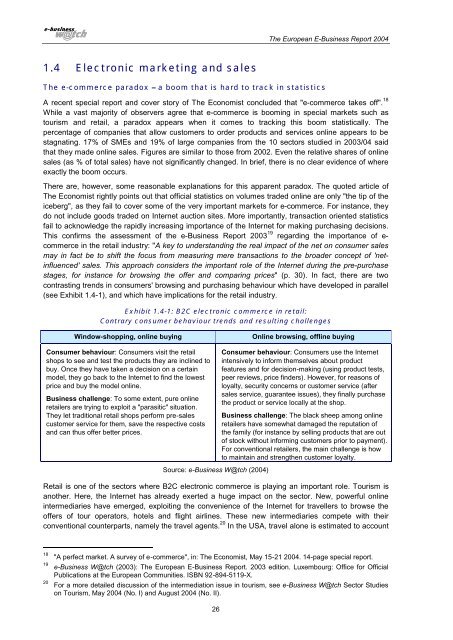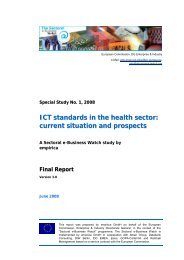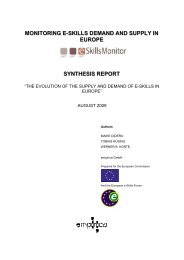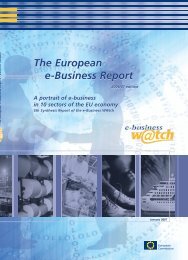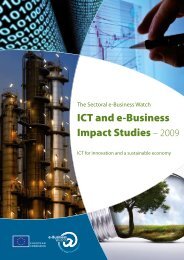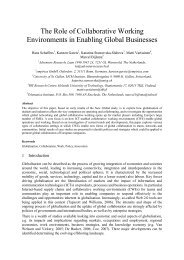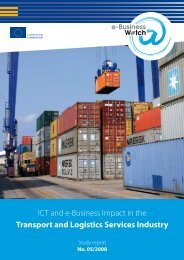The European e-Business Report 2004 - Berlecon Research GmbH
The European e-Business Report 2004 - Berlecon Research GmbH
The European e-Business Report 2004 - Berlecon Research GmbH
You also want an ePaper? Increase the reach of your titles
YUMPU automatically turns print PDFs into web optimized ePapers that Google loves.
<strong>The</strong> <strong>European</strong> E-<strong>Business</strong> <strong>Report</strong> <strong>2004</strong>1.4 Electronic marketing and sales<strong>The</strong> e-commerce paradox – a boom that is hard to track in statisticsA recent special report and cover story of <strong>The</strong> Economist concluded that "e-commerce takes off". 18While a vast majority of observers agree that e-commerce is booming in special markets such astourism and retail, a paradox appears when it comes to tracking this boom statistically. <strong>The</strong>percentage of companies that allow customers to order products and services online appears to bestagnating. 17% of SMEs and 19% of large companies from the 10 sectors studied in 2003/04 saidthat they made online sales. Figures are similar to those from 2002. Even the relative shares of onlinesales (as % of total sales) have not significantly changed. In brief, there is no clear evidence of whereexactly the boom occurs.<strong>The</strong>re are, however, some reasonable explanations for this apparent paradox. <strong>The</strong> quoted article of<strong>The</strong> Economist rightly points out that official statistics on volumes traded online are only "the tip of theiceberg", as they fail to cover some of the very important markets for e-commerce. For instance, theydo not include goods traded on Internet auction sites. More importantly, transaction oriented statisticsfail to acknowledge the rapidly increasing importance of the Internet for making purchasing decisions.This confirms the assessment of the e-<strong>Business</strong> <strong>Report</strong> 2003 19 regarding the importance of e-commerce in the retail industry: "A key to understanding the real impact of the net on consumer salesmay in fact be to shift the focus from measuring mere transactions to the broader concept of 'netinfluenced'sales. This approach considers the important role of the Internet during the pre-purchasestages, for instance for browsing the offer and comparing prices" (p. 30). In fact, there are twocontrasting trends in consumers' browsing and purchasing behaviour which have developed in parallel(see Exhibit 1.4-1), and which have implications for the retail industry.Exhibit 1.4-1: B2C electronic commerce in retail:Contrary consumer behaviour trends and resulting challengesWindow-shopping, online buyingConsumer behaviour: Consumers visit the retailshops to see and test the products they are inclined tobuy. Once they have taken a decision on a certainmodel, they go back to the Internet to find the lowestprice and buy the model online.<strong>Business</strong> challenge: To some extent, pure onlineretailers are trying to exploit a "parasitic" situation.<strong>The</strong>y let traditional retail shops perform pre-salescustomer service for them, save the respective costsand can thus offer better prices.Online browsing, offline buyingConsumer behaviour: Consumers use the Internetintensively to inform themselves about productfeatures and for decision-making (using product tests,peer reviews, price finders). However, for reasons ofloyalty, security concerns or customer service (aftersales service, guarantee issues), they finally purchasethe product or service locally at the shop.<strong>Business</strong> challenge: <strong>The</strong> black sheep among onlineretailers have somewhat damaged the reputation ofthe family (for instance by selling products that are outof stock without informing customers prior to payment).For conventional retailers, the main challenge is howto maintain and strengthen customer loyalty.Source: e-<strong>Business</strong> W@tch (<strong>2004</strong>)Retail is one of the sectors where B2C electronic commerce is playing an important role. Tourism isanother. Here, the Internet has already exerted a huge impact on the sector. New, powerful onlineintermediaries have emerged, exploiting the convenience of the Internet for travellers to browse theoffers of tour operators, hotels and flight airlines. <strong>The</strong>se new intermediaries compete with theirconventional counterparts, namely the travel agents. 20 In the USA, travel alone is estimated to account181920"A perfect market. A survey of e-commerce", in: <strong>The</strong> Economist, May 15-21 <strong>2004</strong>. 14-page special report.e-<strong>Business</strong> W@tch (2003): <strong>The</strong> <strong>European</strong> E-<strong>Business</strong> <strong>Report</strong>. 2003 edition. Luxembourg: Office for OfficialPublications at the <strong>European</strong> Communities. ISBN 92-894-5119-X.For a more detailed discussion of the intermediation issue in tourism, see e-<strong>Business</strong> W@tch Sector Studieson Tourism, May <strong>2004</strong> (No. I) and August <strong>2004</strong> (No. II).26


